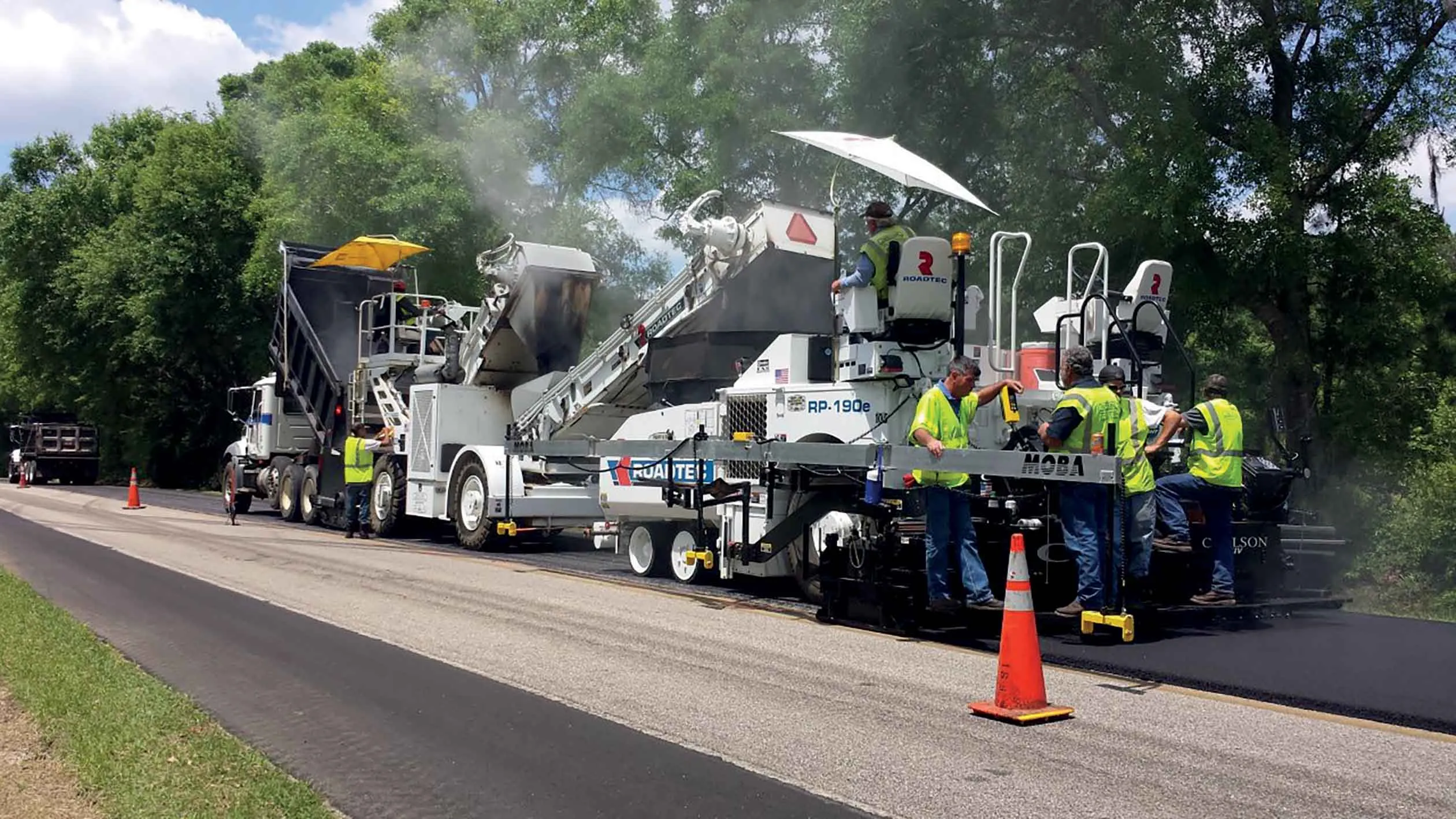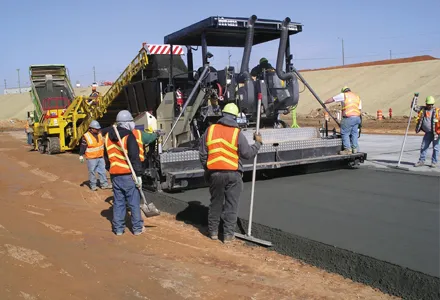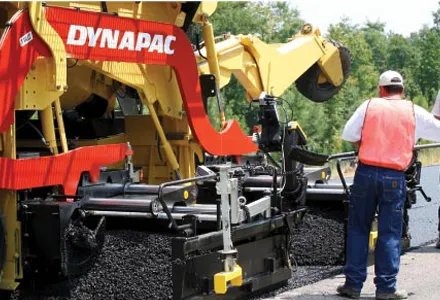The busy I-10 in Florida is now benefiting from a smoother surface, following very necessary reconstruction work. There were no completed sections of I-10 until 1961 when the 59km Sanderson to Jacksonville stretch was first finished. In the years since, section by section have been constructed, culminating in the complete stretch of I-10 in Florida, running 579km through the state.
The interstate stretches west well beyond the Florida border making I-10 one of three coast-to-coast interstates, along with
June 16, 2016
Read time: 4 mins

The busy I-10 in Florida is now benefiting from a smoother surface, following very necessary reconstruction work. There were no completed sections of I-10 until 1961 when the 59km Sanderson to Jacksonville stretch was first finished. In the years since, section by section have been constructed, culminating in the complete stretch of I-10 in Florida, running 579km through the state.
The interstate stretches west well beyond the Florida border making I-10 one of three coast-to-coast interstates, along with I-80 and I-90. In 2015, the2697 Florida Department of Transportation (FDOT) awarded the complete rehab of a 13km section of I-10 between Tallahassee and Monticello, Florida. The traffic load has steadily increased over the years.
Contractor Peavy and Son Construction won the bid for full-depth milling and paving but the stretch needed extensive work as it had last been worked on around 15 years earlier and the surface was in poor shape. The contractor had a 120-day deadline to complete the project. In addition to the poor road condition, the contractor had the challenge of working on a well-travelled road with hills, curves and elevations, as well as width variations of up to 150mm along the outside shoulder edge.
The contractor checked with FDOT to see if it should follow the existing road irregularities or correct it and provide a consistent finished edge. FDOT opted for the corrected road width. The firm then used its highway-class1252 Roadtec RX-900e to mill a depth of 82.5mm.
A total of 17,558m2 of milled material was trucked out with most being converted to RAP. Three lifts of hot-mix asphalt (HMA) were placed using a Roadtec RP-190e rubber-tyred paver designed for highway work. The paver is equipped with a2599 Carlson EZIV Rear Mount Screed and a 1228 MOBA-Matic II grade and slope control system, which adjusts the height and slope of the paver screed and adjusts the paving output of the machine to prevent paving too little or too much material, increasing paving quality and planarity.
Two lifts of structural asphalt were placed with a finishing friction course on top. The first structural asphalt course was 4,510tonnes of Traffic Level B HMA with no polymers. Then 2,526tonnes of Traffic Level D HMA with polymers was placed. A final 7,216tonnes of FC-5 open-graded friction course HMA provided the final traffic surface.
HMA traffic levels are graded A through E based on the design life of the pavement where Level A equals low traffic and Level E equals high traffic. The grading is based on the rate of pavement deterioration from the estimated number of 8.165tonne equivalent single-axle loads (ESALs). For any time period, ESALs on the most heavily travelled lane are estimated using the total traffic for a time period, the percentages of single unit trucks and combination trucks on the road, an equivalent load factor and a lane-load adjustment factor.
Choosing the right HMA is designed to ensure the longest life of a road before maintenance is required. Peavy and Son Construction has its own1250 Astec HMA production plant, which is located approximately 32km from the job site. The company relied on its Roadtec MTV-1000 material transfer vehicle, which is designed for transferring while re-blending paving material to allow for continuous in-line paving.
The company finished the I-10 rehab project before the 120 day deadline and FDOT then conducted laser profile measurements, which showed that the road’s smoothness and rideability were dead on. In terms of quality of smoothness, the finished road received an average IRI (International Roughness Index) score of 32, which is well below the max rating of 48 assigned by the state. The quality of the road earned a 3% bonus plus additional incentive pay.
As a result, the Peavy and Son Construction I-10 work received FDOT’s “Smoothest Pavement of the Year Award” in the Limited Access Roadway category for 2014. Annually FDOT considers all the roadwork completed in the entire state for the year and awards a winner and a runner up based on finished quality for two categories of roads, Primary Roadway and Limited Access Roadway.
The interstate stretches west well beyond the Florida border making I-10 one of three coast-to-coast interstates, along with I-80 and I-90. In 2015, the
Contractor Peavy and Son Construction won the bid for full-depth milling and paving but the stretch needed extensive work as it had last been worked on around 15 years earlier and the surface was in poor shape. The contractor had a 120-day deadline to complete the project. In addition to the poor road condition, the contractor had the challenge of working on a well-travelled road with hills, curves and elevations, as well as width variations of up to 150mm along the outside shoulder edge.
The contractor checked with FDOT to see if it should follow the existing road irregularities or correct it and provide a consistent finished edge. FDOT opted for the corrected road width. The firm then used its highway-class
A total of 17,558m2 of milled material was trucked out with most being converted to RAP. Three lifts of hot-mix asphalt (HMA) were placed using a Roadtec RP-190e rubber-tyred paver designed for highway work. The paver is equipped with a
Two lifts of structural asphalt were placed with a finishing friction course on top. The first structural asphalt course was 4,510tonnes of Traffic Level B HMA with no polymers. Then 2,526tonnes of Traffic Level D HMA with polymers was placed. A final 7,216tonnes of FC-5 open-graded friction course HMA provided the final traffic surface.
HMA traffic levels are graded A through E based on the design life of the pavement where Level A equals low traffic and Level E equals high traffic. The grading is based on the rate of pavement deterioration from the estimated number of 8.165tonne equivalent single-axle loads (ESALs). For any time period, ESALs on the most heavily travelled lane are estimated using the total traffic for a time period, the percentages of single unit trucks and combination trucks on the road, an equivalent load factor and a lane-load adjustment factor.
Choosing the right HMA is designed to ensure the longest life of a road before maintenance is required. Peavy and Son Construction has its own
The company finished the I-10 rehab project before the 120 day deadline and FDOT then conducted laser profile measurements, which showed that the road’s smoothness and rideability were dead on. In terms of quality of smoothness, the finished road received an average IRI (International Roughness Index) score of 32, which is well below the max rating of 48 assigned by the state. The quality of the road earned a 3% bonus plus additional incentive pay.
As a result, the Peavy and Son Construction I-10 work received FDOT’s “Smoothest Pavement of the Year Award” in the Limited Access Roadway category for 2014. Annually FDOT considers all the roadwork completed in the entire state for the year and awards a winner and a runner up based on finished quality for two categories of roads, Primary Roadway and Limited Access Roadway.








